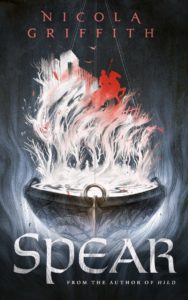
I heard so many rave reviews about Spear by Nicola Griffith that I decided to put it off until its inevitable Hugo nomination. Tordotcom novellas seemed unstoppable, and it was getting nothing but praise. And then it ended up not making the list—perhaps due to category confusion, as the word count puts it in that gray area where it could make the Hugos as either a novel or novella, Tordotcom advertised it as a novella, but it made the Nebula shortlist in the Best Novel category—and I found myself scrambling to squeeze it in between my official Hugo reads. Suffice to say, I’m glad I found time for it.
Spear is an Arthurian tale, but one in which Arthur himself feels like a relatively minor character. Instead, it imagines an alternate backstory for the knight Peretur, recast as a half-Fae woman striking out on her own in a man’s disguise. She sees something worthy of joining in Arthur’s peacekeeping force, but she also finds echoes of her past preventing her from being just another knight.
Without a doubt, Spear is one for the prose fans. While the language is not especially ornate, the commitment to scenic descriptions—particularly the natural elements—yields a wonderful sense of place, and the entire book flows with a rhythm that hints of poetry. But while I often find heavily ornamented language pulling me out of a story more than it draws me in, the simpler descriptions in Spear easily immersed me in the story and kept me there for the duration. It’s not one to speedread, but neither is the language a barrier to entry.
It’s also more a book for the character readers than those looking for plot. Make no mistake, there is plenty of plot progression. But it’s easy to predict that much of the story would turn into a search for a magical object imbued with supernatural power, and Peretur’s ancestry gives her preternatural strength, speed, and resonance with nature that allows her to defeat most human opponents with relative ease. There is a plot, it’s just not especially tense.
Peretur’s character arc, on the other hand, is engrossing, as she leaves the isolated forest of her childhood, learns about herself and about humanity, and emerges on the other side a different woman. It’s not that the steps are necessarily surprising, but her perspective is described so vividly that it’s easy to slip into her mind and invest in each step of the journey. There’s a little bit of discovering the mysteries of the world, a little bit of romance, and a little bit of combat, and all of it is a pleasure to read.
If there’s anything holding the story back, it’s an uncertainty about how to deal with the incredible power of the few extant magical artifacts. It’s easy enough to swallow Peretur’s mixed ancestry giving her uncanny prowess in combat. But there are objects that confer such incredible power that whoever holds them becomes nearly invincible. And the story is simultaneously very aware of these dangers and somewhat reticent to dive deep into the implications. And so what could be major conflicts are reduced to a paragraph or two and dismissed.
In fairness, it’s hard to balance a story with a mostly human cast and a small amount of extremely powerful magic. And while I don’t think Spear gets that balance quite right, it’s still an excellent story. It’s not one for many surprises, but the storytelling is beautiful and the lead character is excellent. And at just under 200 pages, it’s the perfect length to hold onto the wonder of character and setting without any of the meandering feeling that often comes in plot-light stories. In short, it’s excellent.
Recommended if you like: poetic–but not purple!–prose, quiet character journeys.
Can I use it for Bingo? It’s hard mode for Retelling and was also a Book Club selection.
Overall rating: 17 of Tar Vol’s 20. Five stars on Goodreads.
